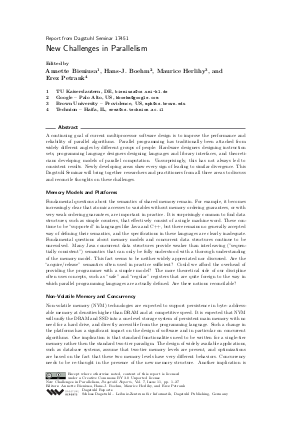New Challenges in Parallelism (Dagstuhl Seminar 17451)
Authors Annette Bieniusa, Hans-J. Boehm, Maurice Herlihy, Erez Petrank and all authors of the abstracts in this report
-
Part of:
Issue:
Dagstuhl Reports, Volume 7, Issue 11
Part of: Volume: Dagstuhl Reports, Volume 7
Part of: Journal: Dagstuhl Reports (DagRep) - License:
 Creative Commons Attribution 3.0 Unported license
Creative Commons Attribution 3.0 Unported license
- Publication Date: 2018-03-28
File

PDF
DagRep.7.11.1.pdf
- Filesize: 2.73 MB
- 27 pages
Document Identifiers
Subject Classification
Keywords
- concurrency
- memory models
- non-volatile memory
Metrics
- Access Statistics
-
Total Accesses (updated on a weekly basis)
0PDF Downloads0Metadata Views
Abstract
A continuing goal of current multiprocessor software design is to improve the performance and reliability of parallel algorithms. Parallel programming has traditionally been attacked from widely different angles by different groups of people: Hardware designers designing instruction sets, programming language designers designing languages and library interfaces, and theoreticians developing models of parallel computation. Unsurprisingly, this has not always led to consistent results. Newly developing areas show every sign of leading to similar divergence. This Dagstuhl Seminar will bring together researchers and practitioners from all three areas to discuss and reconcile thoughts on these challenges.
Cite As Get BibTex
Annette Bieniusa, Hans-J. Boehm, Maurice Herlihy, and Erez Petrank. New Challenges in Parallelism (Dagstuhl Seminar 17451). In Dagstuhl Reports, Volume 7, Issue 11, pp. 1-27, Schloss Dagstuhl – Leibniz-Zentrum für Informatik (2018)
https://doi.org/10.4230/DagRep.7.11.1
BibTex
@Article{bieniusa_et_al:DagRep.7.11.1,
author = {Bieniusa, Annette and Boehm, Hans-J. and Herlihy, Maurice and Petrank, Erez},
title = {{New Challenges in Parallelism (Dagstuhl Seminar 17451)}},
pages = {1--27},
journal = {Dagstuhl Reports},
ISSN = {2192-5283},
year = {2018},
volume = {7},
number = {11},
editor = {Bieniusa, Annette and Boehm, Hans-J. and Herlihy, Maurice and Petrank, Erez},
publisher = {Schloss Dagstuhl -- Leibniz-Zentrum f{\"u}r Informatik},
address = {Dagstuhl, Germany},
URL = {https://drops.dagstuhl.de/entities/document/10.4230/DagRep.7.11.1},
URN = {urn:nbn:de:0030-drops-86681},
doi = {10.4230/DagRep.7.11.1},
annote = {Keywords: concurrency, memory models, non-volatile memory}
}
